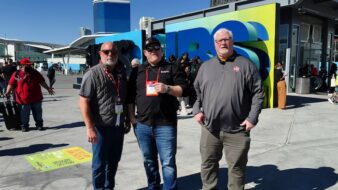School budgets are a hot topic nationwide. So is school energy consumption. Loudon, New Hampshire is no exception. As the town grows, the realization that more teachers will soon be required is coupled with the need to maintain existing programs that benefit students and families.

Chris Smykyl (l) and Bob Ives of Bow Plumbing and Heating converted the heating system in Loudon Elementary School from five oil boilers to four Alpine condensing gas boilers.
Short of raising property taxes, there’s no simple way to make all the pieces of the budget come together seamlessly. So administrators look for areas where cuts can be made without impacting the students’ learning environment and quality of education.
Attention quickly turned to the mechanical room in Loudon Elementary School, where five oil-fired boilers were drinking nearly $30,000 each heating season. To add insult to injury, the system’s underground fuel lines needed to be replaced.

“Not only was fuel consumption an issue, but it would have cost us $30,000 to replace the oil lines from the tank to the mechanical room,” said Merrimack Valley School District plant manager, Neil Barry. “We then learned there was a high-pressure gas line at the street. A $16,000 rebate from the utility for switching to a high-efficiency gas system, combined with the positive long-term outlook for gas prices, and the decision was made.”
Loudon Elementary — one of 14 buildings in the district — was built in the 1960s, with a circa 1980 addition. Distribution throughout the 59,000 square-foot building consists mainly of commercial fin-tube baseboard, but the gym and cafeteria use air handlers.
After collecting two bids for the project, the school hired Bow Plumbing and Heating, in Bow, New Hampshire. The 10-employee firm installs and services commercial and residential hydronic or air-side heating systems. Owner, Bob Ives, is moving the company into its third generation with his children Eric, Timothy and Christina.
“We’ve successfully worked with Bow several times before, but to do my due diligence, I got a second opinion,” said Barry. “The bids were nearly identical, and both used Burnham Alpine condensing boilers.” What followed would be a boiler retrofit yielding a one-and-a-half year payback.
Go time
“We started the project in July and wrapped it up before the back-to-school sales started at the mall,” said Bob Ives, president of Bow P+H. “Once it was decided to use condensing boilers, the decision was easy. We’ve installed Burnham boilers for a long time, and this job wasn’t an exception. The Alpine is efficient and easy to maintain. We fire them up, set the controls, walk away, and they perform like we want them to.”
While technicians from Bow P&H were inside disassembling near-boiler piping and removing large oil boilers, an excavation crew outside removed the big underground oil tank and all the fuel lines. The school wanted it off the property before it became a liability. In short order, freshly-seeded grass was the only evidence that an oil tank ever existed.
“The new system uses four, 399 MBH Alpine boilers, all connected to a manifold system as shown in the installation instructions,” continued Ives. “This way, we effectively have a 20-to-one turndown. Heck, you can even stack these things two-high if you really need to fit them into a small mechanical space.”
A cat 5 cable runs from one unit to the next to cascade the units. Through the master controller, the boilers alternate which boiler is first to fire. This ensures that all units have approximately the same runtime hours, making service simple.
“Rick Gendron, the regional sales representative from U.S. Boiler Company, came to the school when we wired the boilers, and again when we fired it up,” said Ives. “U.S. Boiler support staff is known to go above and beyond, and Rick doesn’t disappoint.”
Although the Loudon School isn’t an unusual job for Bow P&H, most of their work is residential. So being familiar with the Alpine boiler line lets their installers pick models from 80-399 MBH. With the modularity of the unit, they can outfit just about any building, whether it’s a small, single-family residence or a public school.
Downsizing and upgrading
“It’s a big primary/secondary system,” said Ives. “The boilers share a short, thee-inch main loop, and radiation throughout the school draws from the secondary loop. This made staging the boilers even easier, if that’s possible.”
Aside from the near-boiler piping and associated boiler pumps, the distribution didn’t change. The secondary loop is pressurized by a pair of redundant Taco 1600 series pumps. Like the boilers, the large circulators exchange duty and standby operation every so often. The job is a good illustration of how hi-efficiency need not be over-pumped, over-controlled, or over-engineered. With the severe winters that central NH can experience, Ives used a 0°F outdoor design temp.
This past winter, the difference in the budget was dramatic. Heating the school this past year cost $15,000 less than the prior year.
According to Barry, he’s now convinced that schools don’t require massive boilers. He’d rather see several smaller boilers, staged to meet the demand. Not only is the fuel expense much less, but boiler maintenance savings at Loudon Elementary alone are over $1,000 per year.
“I think it surprised a lot of people how a simple retrofit yielded such significant paybacks,” said Barry. “Heat distribution wasn’t changed, insulation wasn’t added; just the boilers. Because of that, I wouldn’t hesitate to retrofit with Burnham Alpines boilers when needed.”





Join the conversation: